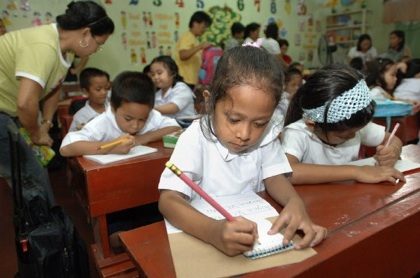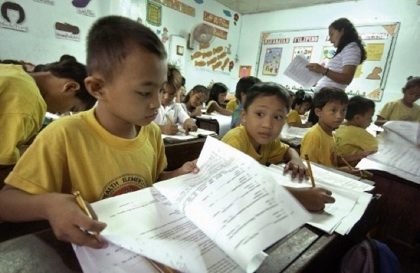SUMMARY
This is AI generated summarization, which may have errors. For context, always refer to the full article.

MANILA, Philippines – Remember Roselle Ambubuyog, the blind mathematics major who graduated valedictorian and summa cum laude from the Ateneo de Manila University?
She made it after Ateneo, a private university, invested in her special needs like Braille software and even tailor-made teaching techniques over a decade ago.
On Friday, April 6, the Department of Education (DepEd) said it wants to achieve a similar feat of effectively honing students with special needs.
In a statement, Education Secretary Armin Luistro announced the government has hiked its budget subsidy for special children or those with learning disabilities. For the new school year that begins in June, Luistro said the DepEd has increased the budget subsidy for elementary Special Education (Sped) centers by 56% to P180-M.
He said the DepEd has also increased the number of its Sped centers to 345 for school year 2012-2013, from 276 in the previous school year.
Based on DepEd data, children with special needs comprise more or less 13% of the Philippines’ youth and children. Various estimates show only around 2% of them currently receive government support.
The government faces the challenge of keeping them in school alongside perennial problems like improving the basic education curriculum and increasing the number of schools and classrooms.

‘Special attention’
“We believe that special learners deserve special attention and specialized learning tools, thus the increase in funding support,” Luistro explained.
Luistro, a former president of the De La Salle University, also instructed school officials to purchase instructional materials “to develop the gifted child’s intellectual abilities and talents,” such as softwares, DVDs, and other audio and video tapes.
Governments should empower persons with disabilities and remove the barriers that prevent them from receiving quality education, among other things, said the World Health Organization (WHO) and the World Bank (WB) in a joint report late last year.
In his preface to the report, world-famous theoretical physicist Stephen Hawking stressed the world’s “moral duty to remove the barriers to participation and to invest sufficient funding and expertise to unlock the vast potential of people with disabilities.”
“Governments throughout the world can no longer overlook the hundreds of millions of people with disabilities who are denied access to health, rehabilitation, support, education, and employment, and never get the chance to shine,” Hawking said.
Family support
In special education, it is not only government funding that matters, however.
In an interview before the Aquino administration took over, then DepEd Special Education Chief Mirla Olores said few special children go to school partly because “parents tend to hide their children with disabilities out of embarrassment.” A number of parents, on the other hand, cite poverty as a reason for not sending special children to school.
“We need intensive advocacy programs to encourage parents of differently-able children to send them to special education classes,” Olores said.
Rappler contributor Michelle Ressa Aventajado wrote about caring for differently abled children in her Move.PH piece, “Step Up for Down.” – Rappler.com
Add a comment
How does this make you feel?
There are no comments yet. Add your comment to start the conversation.